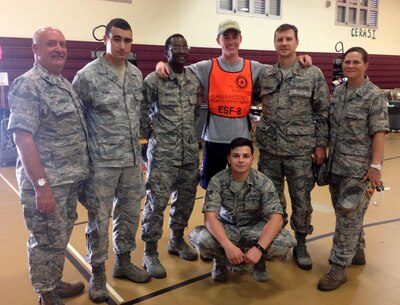By Air Force Master Sgt. William Buchanan, Florida Air
National Guard
PALM COAST, Fla., Sept. 14, 2017 — When disaster strikes,
first responders jump into action at a moment's notice. When Hurricane Irma
sent hundreds of civilians into special-needs shelters here, moments weren't
long enough.
"We had 15 [team members] and we needed 30," said
Air Force Tech. Sgt. Shawnna Landeros, a respiratory therapist with the Florida
Air National Guard’s 125th Medical Group.
"I started looking for other people that were medical
and grabbing them to find 15 more," Landeros added.
Elderly civilians with heart transplants, feeding tubes and
strokes continued to pour into the shelter. Every second counted.
"Within five minutes of me reporting in, Tech. Sgt.
Landeros grabs me and says: ‘This is what we are doing, and they tell us that
we are going out to Flagler to a special-needs shelter,’" said Air Force
Senior Airman Brooke Summy, a medical technician with the 125th Medical
Detachment 1.
The team that headed to special-needs shelter at Rymfire
Elementary School here in Flagler County, with luck, had seven airmen from the
medical field, Summy said. The team assisted first responders, caring for the
502 Floridians sheltered there.
‘The National Guard is Here!’
"When we arrived, one woman yelled, 'The National Guard
is here! The National Guard is here!'" Summy recalled.
Several shelter occupants were dependent on oxygen, Landeros
said. Even though Rymfire Elementary School had backup generators, Landeros
knew that she needed a plan if the power went out.
"We identified where our oxygen tanks were and we
realized that we had to get others that were at another location," she
said.
Guests of the shelter not only had critical medical needs,
some required assistance just for the basics.
"Every 15 minutes, we were lifting patients out and
taking them to the restroom,” Air Force Senior Airman Nelson Rolle said. “We
were doing that all night, from 10 p.m. to 6 a.m."
Little Rest
While most of the airmen found at least a few hours to
sleep, one medical officer, Air Force Maj. Andrew Kurklinsky, a medical
provider with the 125th Medical Detachment 1, sacrificed rest in favor of
solidifying a sustainable special-needs shelter. He took it upon himself to
evaluate the needs of the shelter and come up with a solution to providing
proper care of the Floridians as they rode out Hurricane Irma. The solution:
run the shelter like a hospital.
"The key to the group was Major Kurklinsky," said
Air Force Lt. Col. Matthew Sands, chief of dental service, 125th Group Medical
Unit. "He was able to go in and make the assessments, such as, what was
the need? What was the layout, and what type of patients?"
The first step for these guardsmen was to setup a process
the volunteers could maintain if or when they were needed elsewhere.
"Major Kurklinsky came in and basically produced the
infrastructure and we implemented it," Rolle said. "He was the
director and we were the actors. We went in with a mindset of a mission, even
though we were volunteers."
Helping People in Need
Although airmen train for these kinds of emergencies, the
wind and rain pounding on the shelter walls provided real-world experience that
only strengthened their skills.The Florida guardsmen worked long days in
response to the destruction Hurricane Irma left behind. The airmen working in
this special-needs shelter were no different.Medical expertise wasn’t the only
skill Kurklinsky brought to the special-needs shelter that night.
"There was Russian mother from New York with a
6-month-old baby that had come on vacation and got caught in the storm,"
Sands said. "She had a hard time communicating because she spoke Russian.
Major Kurklinsky speaks Russian, and he was able to communicate with her and
get her some help."
"We asked for this mission, because I knew that this
was going to be a need," Kurklinsky said. "My priority was to set up
a system that was functional, successful and enduring. You have to run it like
a hospital."
With the team giving Kurklinsky a lot of credit, he gives
the credit back to all the volunteers involved.
"Everyone went beyond and everyone went out of their
comforts of their particular jobs," Kurklinsky said. "I appreciate
the reflections of my team for my leadership, but I couldn't have been
successful without my team, their enthusiasm or dedication."

No comments:
Post a Comment